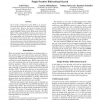Free Online Productivity Tools
i2Speak
i2Symbol
i2OCR
iTex2Img
iWeb2Print
iWeb2Shot
i2Type
iPdf2Split
iPdf2Merge
i2Bopomofo
i2Arabic
i2Style
i2Image
i2PDF
iLatex2Rtf
Sci2ools
114
click to vote
AAAI
2010
2010
Single-Frontier Bidirectional Search
On the surface, bidirectional search (BDS) is an attractive idea with the potential for significant asymptotic reductions in search effort. However, the results in practice often fall far short of expectations. We introduce a new bidirectional search algorithm, Single-Frontier Bidirectional Search (SFBDS). Unlike traditional BDS which keeps two frontiers, SFBDS uses a single frontier. Each node in the tree can be seen as an independent task of finding the shortest path between the current start and current goal. At a particular node we can decide to search from start to goal or from goal to start, choosing the direction with the highest potential for minimizing the total work done. Theoretical results give insights as to when this approach will work and experimental data validates the algorithm for a broad range of domains.
AAAI 2010 | Bidirectional Search | Bidirectional Search Algorithm | Intelligent Agents | Single-Frontier Bidirectional Search |
Related Content
| Added | 29 Oct 2010 |
| Updated | 29 Oct 2010 |
| Type | Conference |
| Year | 2010 |
| Where | AAAI |
| Authors | Ariel Felner, Carsten Moldenhauer, Nathan R. Sturtevant, Jonathan Schaeffer |
Comments (0)

